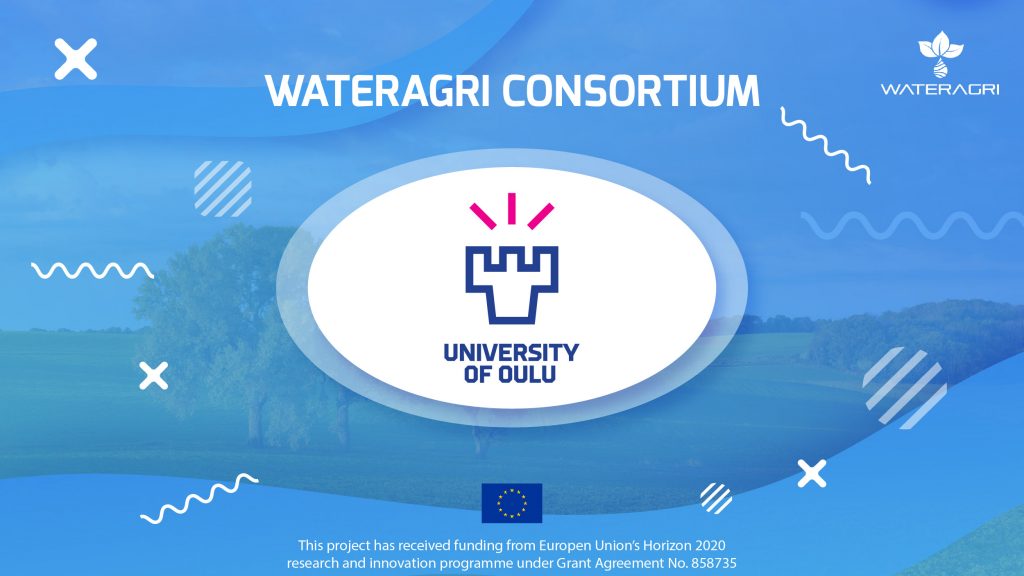OULU (University of Oulu) team comprises 2 research units at the Faculty of Engineering.
Water, Energy and Environmental Engineering Research Unit (WE3 in short). The WE3 unit is led by professor Bjørn Kløve and has 45 research staff and laboratories for soil and water research. The unit carries outs research in a wide range of disciplines such as hydrology, water management, modelling, environmental sciences, biogeochemistry, soil science, water treatment, ecological engineering, landwater- energy nexus, sustainability, waste, energy and environmental engineering. WE3 is a leading unit of water research in Finland. Worldwide, and relevant for the proposed project WATERAGRI, WE3 is known for research applications related to peatland uses including methods to retain water for water quality control. Methods related to water management, water retention, and water quality control are also widely studied by WE3 team members. Many projects are interdisciplinary involving social sciences, economy and ecology. The unit runs several projects, publishes annually 45 journal papers and graduates 3-4 PhDs annually and 20 Master students in the Environmental Engineering programme.
A smaller part of the research work at OULU will be done in collaboration with the Mechatronics and Machine Diagnostics Research Unit, led by Dr Toni Liedes. The group will develop an automatic control well for controlled drainage, water level and soil moisture regulation for water retention, drought control and yield optimization for potato production in particular. The development includes an app for farmer to follow and control field conditions which will be furthered developed here.
Main Role in WATERAGRI
• Lead WP6: Sustainability and Technical Evaluation of Proposed Innovations and Measures
• Involvement in all WPs especially WP2 (Water Resources Management at the Farm-scale), WP3 (Innovative Sustainable Water Retention and Management Measures), WP4 (Nutrient Recovery from Streams), WP5 (Demonstration Case Studies), WP6 (Sustainability and Technical Evaluation of Proposed Innovations and Measures), and WP7 (Framework Development).
• Responsible for case studies in Finland (collaboration with VTT)
• Development of a method to automatically control water levels in drains
• Modelling of hydrology and water retention on peat soils
• Studies on methods to retain water and reduce pollution loads and greenhouse gases from cultivated peatlands
• Involved in developing user-friendly technologies to be implemented in the WATERAGRI framework
• Remote sensing and environmental tracer approach in model development and calibration

Key persons
Prof. Bjørn Kløve (male) is a professor in water engineering (affiliated to OULU since 2002) with research background in hydrology, hydrogeology, water resources engineering, environmental engineering, land use and climate change studies, natural water treatment systems, treatment wetlands and modelling. Prof. Kløve completed his PhD at Lund university in 1997 on the “Environmental Impacts of Peat Mining: Development of storm water control methods” where he developed methods for water retention to reduce erosion, sediment and nutrient transport. The « pipe dam » method has been widely used in peat extraction and also in peatland forestry to retain water and control runoff peaks from land drainage. Prof. Kløve is globally a leading specialist on hydrology and water management, with a focus on peatland hydrological processes, water quality and numerical modelling to assess land use and climate change impacts. He has also worked with methods related to catchment and river restoration including nature-based solutions such as wetland technologies. He is an experienced project manager and coordinator of large projects. He has published more than 170 journal papers (H-index of 32). He is the editor-in-chief of the journal Hydrology Research published by IWA publishing.
Dr Tamara Avellán (female) is Researcher at Oulu and freelancer for environmental consultation. She obtained her Master of Science degree in Biology from Wayne State University, USA, where she focused on the ecological impacts of water quality on aquatic life. Her interest in the effects of excess nutrient loads on plant morphology prompted her to look at nature-based solutions to counteract the sewage impacts in watersheds. Dr. Avellán obtained her PhD from the Ludwig-Maximilians-Universität, Munich, Germany, where she assessed the suitability of crop production at a global scale under future climate change scenarios. In her 8 years within the United Nations System she has worked with a diverse set of stakeholders that reach from local farmers, wastewater treatment technicians, meteorological services and policy makers to ministers of various countries. Dr Avellán is particularly interested in increasing our understanding of bio-physical interlinkages at the same time as addressing social connections to enhance sustainable resource use and ecosystem health.
Dr Docent Hannu Marttila (male) leads the research group on «Northern Hydrology». He is an expert on hydrology, water management and riverine systems. Hydrology editor of Borel Environment Research. He has led several projects related to hydrology and water management. H-index of 15.
Dr Docent Anna-Kaisa Ronkanen (female) leads the research group on «Water quality and Ecological Engineering». She is an expert on hydrology, biogeochemsitry, ecological engineering, constructed wetlands, modellig. h-index 13.
Dr Ali Torabi Haghighi (male) leads the research group on «Land-Water-Energy Nexus». He is an expert on land use, water management, remote sensing and river engineering. H-index of 11.
Dr Pertti Ala-aho (male) an expert on hydrological process and numerical modelling. H-index of 15.
Dr Elisangla Heidescheidt (female) an expert on water quality control, nutrient re-use, recovery and water treatment. H-index of 4.
Dr Toni Liedes (male) and expert on machines, automation and control (Machatronics unit). H-index of 4.